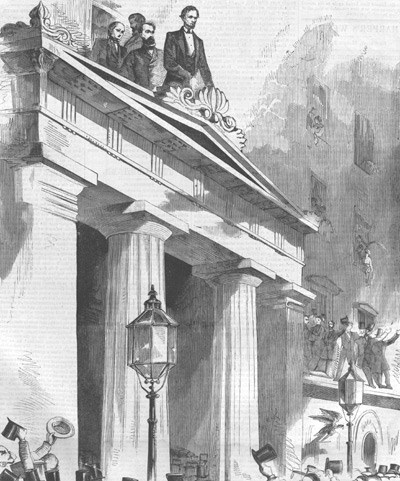
New York, New York February 19-21, 1861 The Lincolns pulled into New York City's 30th Street Station at about 3:00 p.m. on February 19. Evidently Mrs. Lincoln wanted to ensure that her husband made a good impression on the city for it was reported that she smoothed his hair and gave him a kiss before he left the railroad car. Lincoln occupied one of eleven carriages that formed the procession to the Astor House at 217 Broadway, between Vesey and Barclay Streets across from City Hall. Lincoln made remarks at the Astor House at about 4:00 p.m. and then met with a variety of Republican electors, delegates, and Republican club members. The following morning Lincoln had breakfast at former congressman Moses H. Grinnell's house at Fifth Avenue and Fourteenth Street. He returned to the Astor House where he met 94 year old Joshua Dewey who had voted in every presidential election since America's first presidential election of George Washington in 1789. Lincoln then visited City Hall where he met Democratic Mayor Fernando Wood and the city council members and held a public reception which included shaking hands with about thirty War of 1812 veterans. New York was a northern city but with close economic ties to the south through the cotton trade and in the previous month, January 1861, Mayor Wood had suggested to the City Council that New York City secede from the Union and declare itself a free city, in order to continue its profitable cotton trade with the Confederacy. During his February visit Lincoln responded to Wood's earlier sentiments with a promise of preservation of the Union. It is with feelings of deep gratitude that I make my acknowledgment for this reception which has been given me in the great commercial city of New York. I cannot but remember that this is done by a people who do not by a majority agree with me in political sentiments. There is nothing that can ever bring me willingly to consent to the destruction of this Union, under which not only the commercial city of New York, but the whole country has acquired its greatness . . . . I understand a ship to be made for the carrying and preservation of the cargo, and so long as the ship can be saved, with the cargo, it should never be abandoned. This Union should likewise never be abandoned unless it fails and the probability of its preservation shall cease to exist without throwing the passengers and cargo overboard. From the balcony of city hall, Lincoln made, what by this time, was his usual brief complimentary remarks. I do not appear for the purpose of making a speech. I design to make no speech. I came merely to see you, and allow you to see me. And I have to say to you, as I have said frequently to audiences on my journey, that, in the sight, I have the best of the bargain. Assuming that you are all for the Constitution, the Union, and the perpetual liberties of this people, I bid you farewell. The remainder of the day was taken up with a variety of activities. Lincoln and his family had dinner with Vice President-elect Hamlin at the Astor House. Showman P.T. Barnum had invited the Lincolns to visit his American Museum at the corner of Ann Street and Broadway. Lincoln declined the invitation, but Mary and the boys accepted. That evening Lincoln attended the opera, "Un Ballo in Maschera" at the Academy of Music at Fourteenth Street and Fifth Avenue where he created a bit of a stir when he wore black gloves instead of white.
|
Last updated: March 5, 2017
